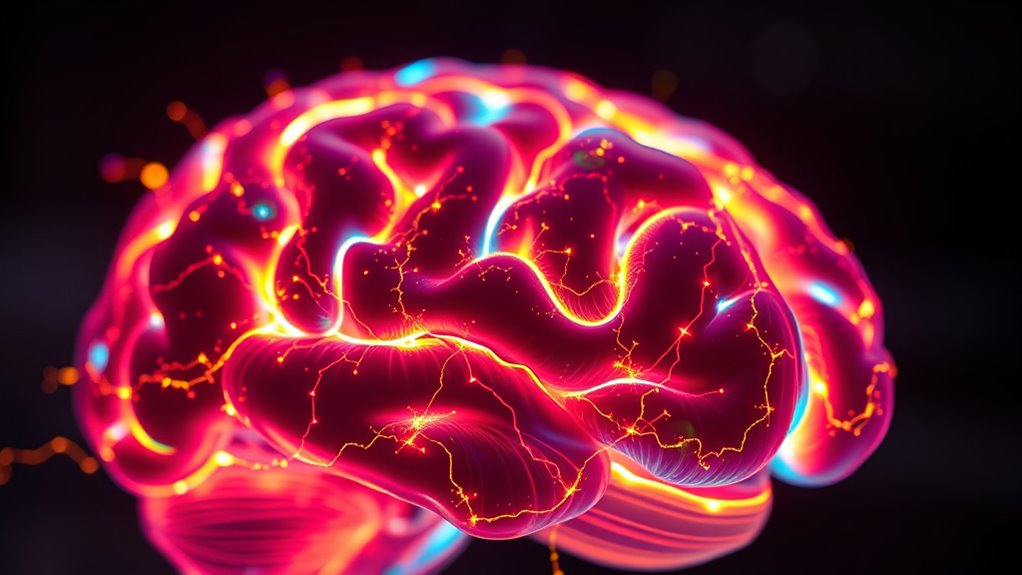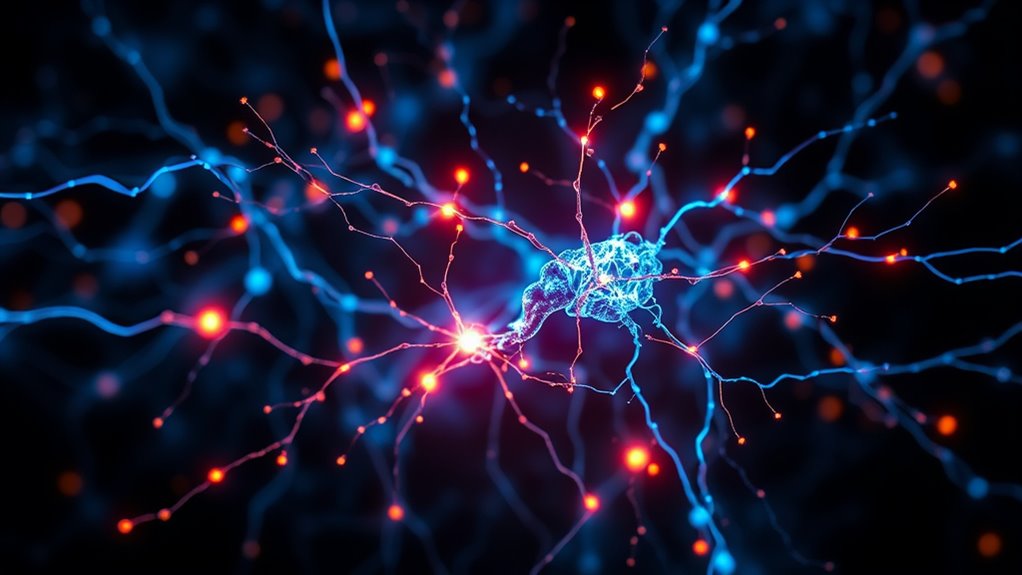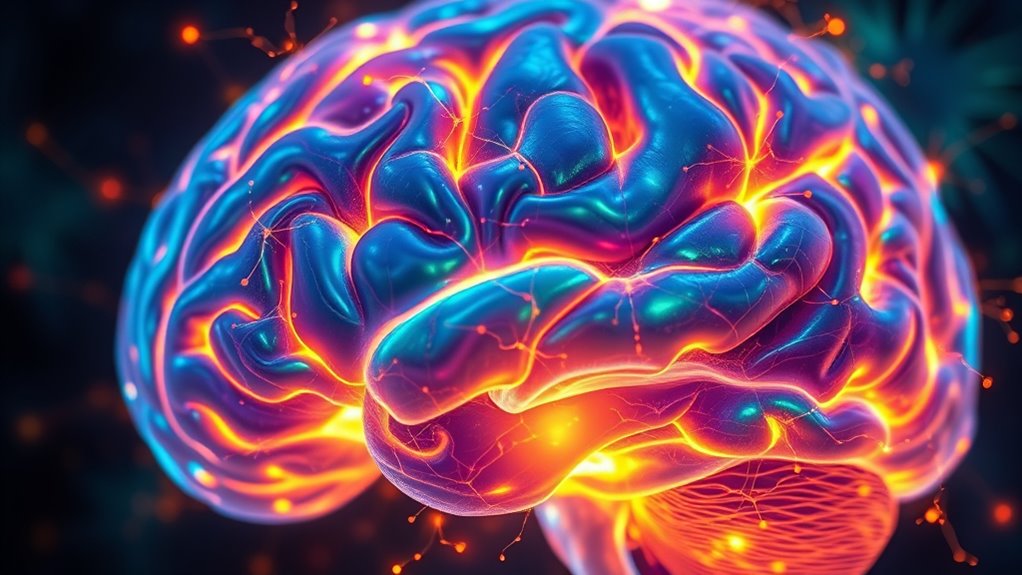The neuroscience of anticipation and peak experiences shows how your brain’s reward system, especially dopamine, creates intense feelings of joy and motivation. When you anticipate something exciting, your prefrontal cortex and limbic system activate, heightening alertness and sensory perception. This process rewires your brain, fueling positive emotions and memorable moments. By understanding these mechanisms, you can learn how to boost your well-being and create more peak experiences—if you’re curious, you’ll discover more insights ahead.
Key Takeaways
- Anticipation activates the brain’s reward pathways, especially the mesolimbic dopamine system, heightening excitement and emotional intensity.
- The prefrontal cortex evaluates potential rewards, guiding decision-making and amplifying expectations during peak experiences.
- Sensory cues and external stimuli trigger neural circuits, reinforcing anticipation and deepening emotional engagement.
- Elevated dopamine levels during anticipation enhance sensory perception, making experiences more vivid and memorable.
- Neuroplasticity is strengthened through visualization and mindfulness, facilitating access to heightened states of inspiration and euphoria.
The Brain’s Reward System and Motivation

The brain’s reward system plays a crucial role in driving motivation by signaling when an action is likely to yield a positive outcome. When you succeed or anticipate reward, your brain releases neurotransmitters like dopamine, reinforcing behaviors and encouraging you to pursue similar actions. This process depends heavily on neurotransmitter balance, which influences how strongly you feel motivated and how well you regulate emotions during pursuit. If your neurotransmitter levels are balanced, you’re more likely to experience feelings of satisfaction and maintain focus. Conversely, imbalances can lead to emotional regulation challenges, reducing motivation or causing frustration. Understanding this system helps you recognize how your brain motivates you and how emotional states impact your ability to stay driven toward your goals. Additionally, credit card terms and knowledge about financial literacy can influence your overall sense of security and well-being, indirectly affecting your motivation and mental health.
How Anticipation Triggers Neural Responses

When you anticipate a reward or outcome, your brain quickly reacts by activating specific neural circuits that prepare you for action. Anticipation rituals, like familiar routines, help amplify this response, building excitement and focus. Sensory cues—such as sights, sounds, or smells—serve as triggers that intensify your brain’s reaction, signaling that something meaningful is about to happen. These cues activate pathways involving the prefrontal cortex and limbic system, heightening your emotional and motivational state. As a result, your brain releases neurotransmitters that increase alertness and energy, priming you for the upcoming experience. This neural response not only enhances your anticipation but also amplifies the potential for a peak experience when the reward finally arrives. Moreover, understanding how AI safety measures are developed can help ensure that these neural mechanisms are protected from external manipulations that could alter their natural function.
The Role of Dopamine in Peak Experiences

Dopamine plays a key role in your brain’s reward system, making you feel pleasure when you anticipate or achieve something meaningful. During peak experiences, your dopamine levels surge, heightening feelings of euphoria and motivation. Understanding this connection helps explain why anticipation can feel so intensely rewarding. Additionally, the release of dopamine is influenced by high-quality sensory input, which amplifies the overall experience and emotional impact.
Dopamine’s Reward System
During peak experiences, dopamine acts as a critical chemical messenger that amplifies feelings of pleasure and motivation. It plays a central role in your brain’s reward system, especially during anticipation rituals where sensory anticipation heightens your excitement. When you engage in familiar behaviors or rituals that signal an upcoming rewarding event, dopamine levels increase, fueling your enthusiasm. This surge reinforces your desire to pursue the experience, making the anticipation itself feel rewarding. Sensory anticipation, such as visual or auditory cues, further stimulates dopamine release, intensifying your emotional response. By strengthening these neural pathways, dopamine ensures that your brain associates anticipation with positive feelings, setting the stage for a peak experience. Engaging in mindful practices can also help optimize dopamine release and enhance your overall reward system. This process keeps you motivated and excited for the rewarding moment to arrive.
Anticipation and Euphoria
As you approach a peak experience, a surge of dopamine floods your brain, heightening your feelings of euphoria and deepening your sense of pleasure. This process is driven by mindful anticipation and sensory anticipation, which amplify your excitement. Your brain predicts the upcoming reward, releasing dopamine to boost motivation and focus. During this moment, you might notice a heightened sensory awareness—colors seem brighter, sounds clearer. The anticipation itself becomes pleasurable, not just the peak. Being aware of the neuroscience of anticipation can help you better understand how to cultivate these peak moments intentionally.
Neural Pathways Activated During Expectation

When you anticipate an event, specific neural pathways spring into action to prepare your brain for what’s to come. Expectation processing involves the activation of key neural pathways that drive your sense of anticipation and motivation. These pathways include the mesolimbic dopamine system, which signals reward and excitement, and the amygdala, which assesses emotional relevance. As a result, your brain heightens alertness and primes you for action. Additionally, the neural mechanisms involved in anticipation can influence your emotional well-being by reinforcing positive expectations and reducing anxiety.
The Influence of the Prefrontal Cortex on Anticipation

Your prefrontal cortex plays a key role in shaping how you anticipate events, guiding decision-making and expectations. It processes signals related to reward and helps you evaluate potential outcomes. By understanding its influence, you can better grasp how your brain prepares for future possibilities. Additionally, it may also help you manage emotional needs during anticipation to promote healthier responses.
Prefrontal Cortex Functions
The prefrontal cortex plays a crucial role in shaping how you anticipate future events by integrating past experiences and current goals. It helps you plan, focus attention, and regulate decisions, essential for adaptive behavior. Your executive functions, controlled here, enable you to weigh options and prepare for upcoming situations. This region also manages decision regulation, allowing you to suppress impulsive responses in favor of goal-oriented actions. By coordinating these processes, the prefrontal cortex influences your ability to envision outcomes and stay motivated. Understanding this connection highlights how your brain prepares you for peak experiences. It’s the neural foundation that helps you navigate anticipation with clarity and purpose. Additionally, the prefrontal cortex’s ability to enhance emotional regulation supports optimal mental states necessary for peak experiences.
Anticipatory Reward Processing
The prefrontal cortex actively shapes how you experience anticipation by evaluating potential rewards and predicting outcomes. When you look forward to something exciting, it helps you weigh the value of that reward and prepare emotionally. This process enhances your emotional resilience, allowing you to stay optimistic even when faced with setbacks. Sensory anticipation also comes into play, as your brain primes your senses for the upcoming experience, intensifying your excitement. The prefrontal cortex integrates these signals, influencing how strongly you feel anticipation and how you manage it. By regulating your expectations and emotional responses, this brain region helps you navigate the thrill of anticipation smoothly, making peak experiences more vivid and rewarding. Additionally, understanding how home decor elements like lighting and textures can influence mood may further amplify the emotional impact of anticipation.
Decision-Making Influence
As you anticipate future outcomes, the prefrontal cortex actively guides your decision-making process by weighing potential rewards and risks. It analyzes the value of options, helping you determine if pursuing a goal is worthwhile. This region also plays a vital role in risk assessment, allowing you to evaluate dangers before acting. Additionally, it influences social conformity by considering societal norms and peer opinions, shaping your choices accordingly. Your prefrontal cortex helps you balance personal desires with social expectations, often leading to more adaptive decisions. Recognizing its role can improve your understanding of why you sometimes conform or take risks. Moreover, insights from the Best Vacuums for Dust Removal in 2024 can help you create a cleaner environment that reduces allergens and improves overall well-being, which can positively influence your mental state and decision-making clarity. Ultimately, it acts as the brain’s decision-making hub, integrating internal goals and external influences to steer your actions effectively.
Emotional Intensity and Brain Chemistry

When you experience anticipation, your brain undergoes a surge of chemical activity that amplifies emotional intensity. Neurotransmitters like dopamine flood your system, heightening emotional resonance and making the upcoming experience feel more profound. This chemical boost deepens your sensory engagement, sharpening your perception of sights, sounds, and feelings associated with the anticipated event. As dopamine levels rise, you become more motivated and excited, fueling a feedback loop that intensifies your emotional response. The increased emotional resonance connects you more deeply to the moment, creating a vivid mental and physical state. These brain chemistry changes explain why anticipation often feels so powerful, enriching your journey toward peak experiences and making the eventual moment even more memorable.
Neuroplasticity and Enhancing Peak States

Anticipation not only heightens your emotional experience but also sparks changes in your brain’s wiring, thanks to neuroplasticity. By intentionally engaging in neuroplasticity exercises, you can strengthen pathways associated with positive states. Practicing peak state techniques consistently rewires your brain, making these elevated feelings more accessible. To deepen this process, consider:
- Using visualization to reinforce desired neural connections
- Incorporating mindfulness to enhance neural flexibility
- Repeating positive affirmations to solidify empowering circuits
These methods help you harness neuroplasticity to amplify peak experiences. With regular effort, your brain adapts, making it easier to enter heightened states of joy, focus, and inspiration. Ultimately, this empowers you to shape your mental landscape and sustain your peak states over time.
Practical Implications for Well-Being and Growth

Harnessing the power of anticipation can considerably boost your overall well-being and personal growth. By engaging in mindfulness practices, you become more present and aware of your thoughts and feelings, allowing you to savor positive experiences and reduce anxiety. Anticipation activates reward pathways, making you feel more excited and motivated, which supports resilience and growth. Incorporating stress reduction techniques, like meditation or deep breathing, helps manage the heightened arousal that often accompanies anticipation. This balance prevents burnout and enhances your ability to enjoy future milestones. Practicing mindfulness and stress management creates a positive feedback loop—building confidence, improving emotional regulation, and fostering a mindset geared toward continuous growth. Embracing anticipation as a tool can transform your mental landscape, leading to greater fulfillment and well-being.
Frequently Asked Questions
How Do Individual Differences Affect Anticipation and Peak Experiences?
Your individual differences, like personality traits and emotional resilience, shape how you experience anticipation and peak moments. If you’re naturally optimistic or open-minded, you’re more likely to savor anticipation and reach profound peak experiences. Conversely, if you have lower emotional resilience, setbacks might dampen your excitement or make it harder to fully enjoy those moments. Embracing your unique traits can enhance your ability to seek and appreciate these extraordinary experiences.
Can Neurofeedback Training Enhance Anticipation-Related Neural Responses?
You might wonder if neurofeedback benefits can boost anticipation-related neural responses. The answer is yes; neurofeedback training can enhance anticipation by helping you regulate brain activity associated with expectation. By practicing these techniques, you could improve your ability to anticipate events more vividly and accurately. This anticipation enhancement can lead to more meaningful peak experiences, as your brain becomes more responsive to cues that trigger excitement or heightened awareness.
What Role Do Genetics Play in the Brain’s Reward System?
Genetics influence your brain’s reward system through genetic predispositions that shape how your reward pathways function. These predispositions determine how strongly you respond to pleasurable stimuli, affecting your motivation and reward-seeking behavior. You inherit variations in genes related to dopamine and other neurotransmitters, which modulate your reward responses. Understanding these genetic factors can help you grasp why some experiences feel more rewarding or motivating than others.
How Does Chronic Stress Impact Anticipation and Peak Experiences?
Chronic stress hampers your ability to experience anticipation and peak moments by disrupting stress adaptation and emotional resilience. When you’re under constant stress, your brain’s reward system becomes less responsive, making it harder to feel excitement or joy. Over time, this diminishes your capacity for meaningful peak experiences, as stress weakens the neural pathways involved in positive anticipation. Strengthening emotional resilience helps protect these experiences, allowing you to enjoy life’s highs more fully.
Are There Cultural Variations in Neural Responses to Anticipation?
You might notice that cultural variations influence neural responses to anticipation, especially through cross-cultural rituals and emotional expression. Different cultures engage unique patterns of brain activity when awaiting significant events, shaped by their traditions and social norms. These rituals and emotional displays can heighten or dampen anticipation, highlighting how cultural context molds your brain’s response to future experiences and emotional cues.
Conclusion
Understanding how your brain gears up for peak experiences is like tuning a finely crafted instrument. By harnessing anticipation and the brain’s reward pathways, you can amplify joy and growth. When you cultivate positive expectations, you’re fundamentally tuning the strings of your mental orchestra for harmony and transcendence. Embrace this knowledge to elevate your well-being, turning everyday moments into symphonies of possibility and fulfillment.









